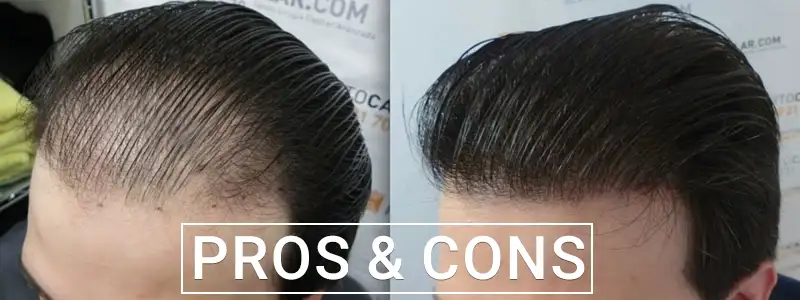FUE Advantages & Disadvantages
October 27, 2020

The hair transplant industry has become the top cosmetic industry with about $5 Billion annual revenue worldwide. This rapid growth is beneficial for people to undergo the most advanced hair restoration treatments easily. However, it is also attracting the attention of the ‘wrong people.’ These people see the hair transplant industry as a rapidly growing and profitable business. As a result, they want to have their share in the revenue. For that purpose, they have established the hair transplant black market. They have no interest in the patient’s health or wellbeing, and they only care about making money. Unfortunately, unsuspecting customers can easily become their prey. Therefore, it is essential to raise awareness among potential clients about these shady practitioners in the back alleys.
Patients must be cautious during their screening process for the right hair transplant surgeon/clinic. In this article, we have shared how patients can detect black-market frauds and how they can avoid them.
Keep reading to learn more!
Detecting the hair transplant black market is relatively easier than it seems. All the patients have to do is be vigilant during the screening and not fall down a rabbit hole.
We want our patients to be well-informed and safe. Therefore, we asked Dr. Cagatay Sezgin about how to detect shady practitioners/clinics for hair transplants. Dr. Sezgin is the 1st Turkish Board Surgeon, registered as a member of the International Society of Hair Restoration Surgery (ISHRS). ISHRS is the leading hair transplant authority in the world.
Dr. Sezgin offered the following tips for detecting black-market hair transplant providers.
More often than not, the most obvious factor that determines if a provider is genuine or fraud is their prices. Usually, the hair transplant black market offers its services at extremely cheap rates. For instance, phrases like buy one get one free or one dollar transplant are quite common.
These fraudulent providers often claim to extract and harvest a higher graft count. Generally, they claim to extract more than 9000 hair grafts in a single session. However, this is a deceptive figure that cannot be achieved in one session. Moreover, if they try to achieve this goal, it will pose a serious threat to the patient’s health.
The biggest scam these illicit facilities pull is to convince the patients that a board-certified surgeon will perform the transplant. However, there is no such case. The entire procedure is carried out by unlicensed non-medical or technicians. In most cases, patients don’t even see a doctor from initial consultation to the surgery.
Since the black-market hair transplant providers only care about the money, they have no fixed rates. Moreover, they don’t even have a transparent pricing policy with per graft rates, etc. In some cases, if they feel like losing a client, they even reduce their initial prices. However, no well-reputed clinic lowers its prices on the spot unless there is a discount offer or a special need.
These fraudulent and illicit clinics do not have any moral or ethical values, and they only care about the money. They bear no responsibility for the patient’s health and well-being. Generally, they perform at least 5-10 transplants in a day. Therefore, their primary aim is to trick people into getting low-quality transplants from unlicensed practitioners for the sake of a few bucks.
The hair transplant black market has been a cause of concern for patients as well as certified surgeons. The International Society of Hair Restoration Surgery (ISHRS) has been trying to eradicate these illicit clinics and abolish their practices. For this purpose, they launched a multi-pronged public awareness campaign in 2019. This campaign’s primary aim is to raise awareness and educate unsuspecting clients about black-market hair transplant clinics. Moreover, they guide the potential patients about how to find a qualified hair transplant surgeon.
The ISHRS has taken many steps to educate consumers about the hair transplant black market. One of the most promising efforts in this regard is the Fight The FIGHT campaign. It stands for Fight the Fraudulent, Illicit & Global Hair Transplants.
Ricardo Mejia, MD, FISHRS, is the chair of the ISHRS Committee on Issues Pertaining to the Unlicensed Practice of Medicine. He is also a Fellow at the American Academy of Dermatology. About this campaign, he says:
“Our goal with the Fight The FIGHT campaign is to not only warn consumers about this dangerous practice, but to educate them on how to recognize deceptive marketing techniques and how to find qualified physicians trained in the art and science of hair restoration surgery.” – (ISHRS)
This campaign has addressed the growing global issue of unlicensed non-physicians performing hair transplants for quite a while. Fight The FIGHT has also launched a website where they share tips, answer FAQs, report case studies, and help patients find certified surgeons.
According to ISHRS and Dr. Cagatay Sezgin, patients must ask the following questions during the initial consultation session. These questions will help them determine whether a practitioner is fraudulent or not. Moreover, these questions will help them make an informed decision, as well.
The patients must ask the following questions from the practitioner:
Patients must ask questions about the surgeon’s education, training, license, and experience in performing hair transplants.
Usually, a hair transplant surgeon works with a team of assistants. So, patients should also ask about their role in the procedure as well as their education, training, license, and experience.
Sometimes surgeons ask their assistants or technicians to prep for the surgery. If that is the case at your clinic, ask questions about the particular person. Patients must ask about his/her specific role and the reason why he/she is legally permitted to perform it.
To be safer, patients should also ask if the staff and surgeons are covered by malpractice insurance. Due to this, patients will be able to pursue their cases legally if any mishaps occur.
The hair transplant black market is rapidly growing, and patients must be aware of the complications that they can cause. In order to stay safe, patients must be vigilant during their search for the right hair transplant surgeon or clinic. They shouldn’t make a hasty decision which they will regret later.
Dr. Cagatay Sezgin is a celebrity hair transplant surgeon with over 20 years of experience in hair transplantation and restoration. He is the First Turkish Board Surgeon to become a member of the International Society of Hair Restoration Surgery (ISHRS) and the Asian Association of Hair Transplant Surgeons (AAHRS). Moreover, he has the honor of becoming the first hair transplant surgeon in the world to perform hair, eyebrow, and beard transplantation all in one case and that too in a single session.

October 27, 2020

June 13, 2017

April 22, 2016